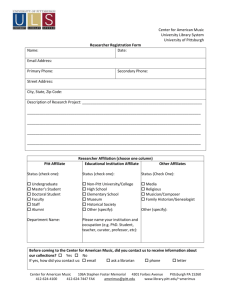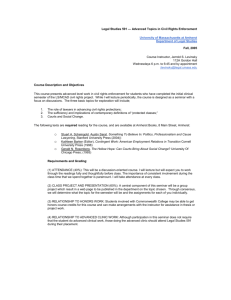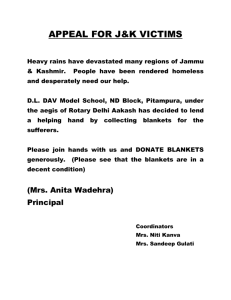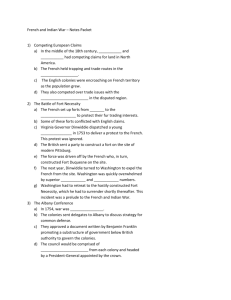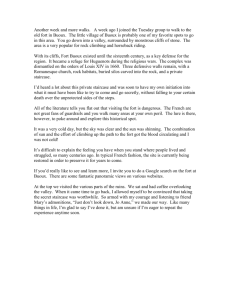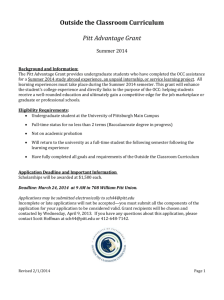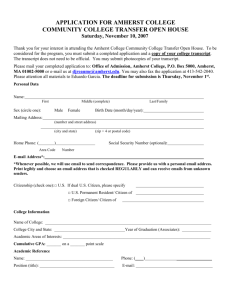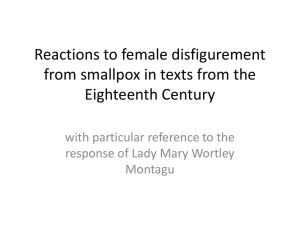Unit One Review
advertisement
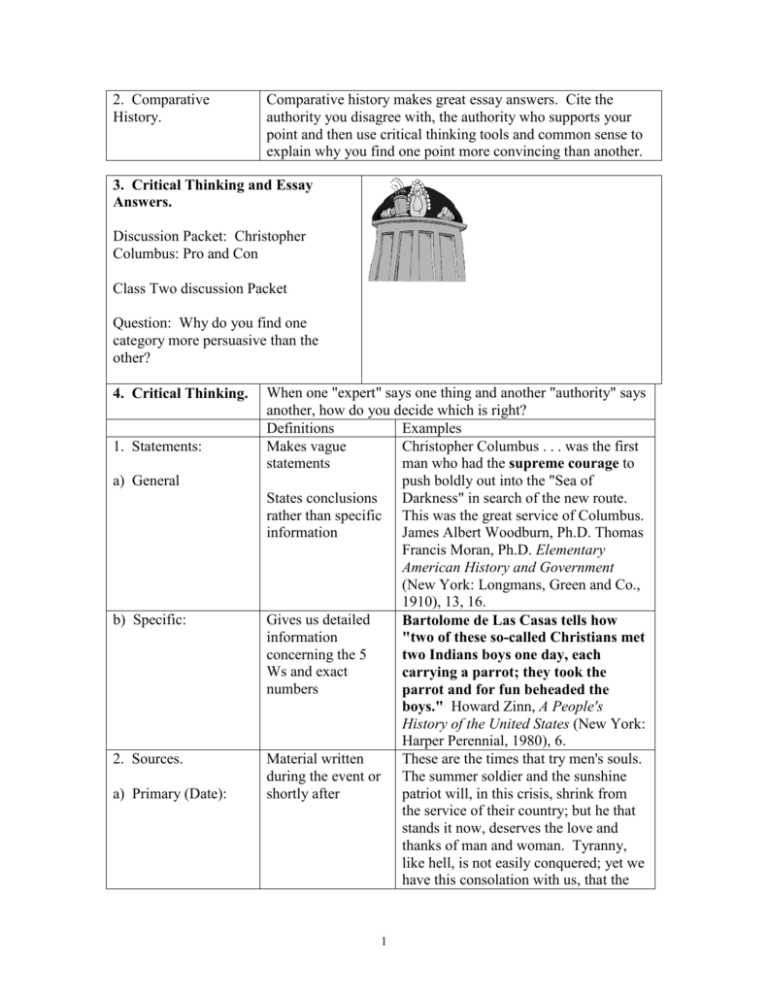
2. Comparative History. Comparative history makes great essay answers. Cite the authority you disagree with, the authority who supports your point and then use critical thinking tools and common sense to explain why you find one point more convincing than another. 3. Critical Thinking and Essay Answers. Discussion Packet: Christopher Columbus: Pro and Con Class Two discussion Packet Question: Why do you find one category more persuasive than the other? 4. Critical Thinking. 1. Statements: a) General b) Specific: 2. Sources. a) Primary (Date): When one "expert" says one thing and another "authority" says another, how do you decide which is right? Definitions Examples Makes vague Christopher Columbus . . . was the first statements man who had the supreme courage to push boldly out into the "Sea of States conclusions Darkness" in search of the new route. rather than specific This was the great service of Columbus. information James Albert Woodburn, Ph.D. Thomas Francis Moran, Ph.D. Elementary American History and Government (New York: Longmans, Green and Co., 1910), 13, 16. Gives us detailed Bartolome de Las Casas tells how information "two of these so-called Christians met concerning the 5 two Indians boys one day, each Ws and exact carrying a parrot; they took the numbers parrot and for fun beheaded the boys." Howard Zinn, A People's History of the United States (New York: Harper Perennial, 1980), 6. Material written These are the times that try men's souls. during the event or The summer soldier and the sunshine shortly after patriot will, in this crisis, shrink from the service of their country; but he that stands it now, deserves the love and thanks of man and woman. Tyranny, like hell, is not easily conquered; yet we have this consolation with us, that the 1 b) Secondary Sources: Materials written long after the event 3. Activity a) Participants Persons directly involved in the event 2 harder the conflict, the more glorious the triumph. What we obtain too cheap, we esteem too lightly: it is dearness only that gives every thing its value. Heaven knows how to put a proper price upon its goods; and it would be strange indeed if so celestial an article as Freedom should not be highly rated. Britain, with an army to enforce her tyranny, has declared that she has a right (not only to Tax) but "to Bind us in All Cases Whatsoever," and if being bound in that manner, is not slavery, then is there not such a thing as slavery upon earth. Even the expression is impious; for so unlimited a power can belong only to God. Thomas Paine, American Crisis, Common Sense (December 23, 1776). “A husband could safely sleep with other women, knowing that his wife could not take legal action in divorce. If he caught his wife committing adultery he could prosecute her lover for abduction, because the wife was not supposed to possess a power of consent. He could also obtain a divorce, in most colonies, in which case his wife would be forbidden by law to marry her lover. Even in the case of bigamy, a first wife could not take action to dissolve her marriage, because in court nothing was decreed that tended to bastardize the issue born in wedlock. Illegitimacy was recognized by law only when a woman was unfaithful to her husband.” Elizabeth Evans, Weathering The Storm: Women of the American Revolution (New York: Charles Scribner’s Sons, 1975), 3 Bartolome de Las Casas (A Spanish Priest who sailed with the early Spanish Conquistadors) tells how "two of these so-called Christians met two Indians boys one day, each carrying a parrot; they took the parrot and for fun b) Mythologiziers Writers who try to make the event larger than life 4. Wheat vs. Chaff. That which is objective. a) Facts Things that we can verify, confirm, and be highly certain of accuracy b) Interpretation What does the event mean? Casualty. Speculation Moving from specific fact and making general statements about history, society or culture. 3 beheaded the boys." Howard Zinn, A People's History of the United States (New York: Harper Perennial, 1980), 6. Christopher Columbus . . . was the first man who had the supreme courage to push boldly out into the "Sea of Darkness" in search of the new route. This was the great service of Columbus. James Albert Woodburn, Ph.D. Thomas Francis Moran, Ph.D. Elementary American History and Government (New York: Longmans, Green and Co., 1910), 13, 16. At Fort Pitt, two ostensibly friendly Delaware Indians showed up at the end of May to suggest that the British leave to avoid attack. Pitt's commander thanked them but declined their suggestion and sent them on their way with his idea of a gift: two blankets and a handkerchief used by British smallpox patients in the fort. "We hope it will have the desired effect," wrote a militiaman in his diary. Two months later, Jeffrey Amherst suggested to a subordinate that spreading smallpox-a practice akin to later germ warfare should be considered as a method of war: "We must use Every Strategem in our Power to Reduce them." James L. Roark, 141. At Fort Pitt, two ostensibly friendly Delaware Indians showed up at the end of May to suggest that the British leave to avoid attack. Pitt's commander thanked them but declined their suggestion and sent them on their way with his idea of a gift: two blankets and a handkerchief used by British smallpox patients in the fort. "We hope it will have the desired effect," wrote a militiaman in his diary. Two months later, Jeffrey Amherst suggested to a subordinate that spreading smallpox-a practice akin to later germ warfare should be considered as a method of 5. Neutrality. a) Objective b) Bias Things that we can verify, confirm, and be highly certain of accuracy Businessmen are likely to justify the social value of their line of work. A President is likely to tout his own virtues Look for statements made against interest. 6. Purpose: Designed to inform the reader. a) Information: 4 war: "We must use Every Strategem in our Power to Reduce them." There is no evidence that the infected blankets actually propagated smallpox or that Amherst's war strategem was put into greater practice. James L. Roark, 141. On July 26, 1787 the Constitutional Convention adjourned for ten days while a Committee of Detail, John Rutledge of South Carolina, Edmund Randolph of Virginia, Nathaniel Gorham of Massachusetts, Oliver Ellsworth of Connecticut and James Wilson of Pennsylvania met to arrange and systematize materials. At the beginning of the Committee's deliberations, John Rutledge read aloud some excerpts from Iroquois Indian treaties that reflected the will of the people. Pennsylvania Herald, 18 August 1787, Charles L. Mee Jr, The Genius of the People (New York: Harper & Row, 1987), 237. American history has long been written as a kind of Eurocentric mythology. John C. Mohawk and Oren R. Lyons, chief of the Onondaga Nation, Iroquois Confederacy, Associate Professor of American Studies, State University of New York, Buffalo, Exiles in the Land of the Free: Democracy, Indian Nations and the US Constitution (Santa Fe, New Mexico: Clear Light Publishers, 1992), 3. At Fort Pitt, two ostensibly friendly Delaware Indians showed up at the end of May to suggest that the British leave to avoid attack. Pitt's commander thanked them but declined their suggestion and sent them on their way with his idea of a gift: two blankets and a handkerchief used by British smallpox patients in the fort. "We hope it will have the desired effect," wrote a mili- tiaman in his diary. Two months later, Jeffrey Amherst suggested to a subordinate that spreading smallpox-a practice akin to later germ warfare should be considered as a method of war: "We must use Every Strategem in our Power to Reduce them." There is no evidence that the infected blankets actually propagated smallpox or that Amherst's war strategem was put into greater practice. James L. Roark, 141. b) Propaganda: Information given with a political purpose. It is designed to convince the reader of something. Unknowingly, they also smuggled along many Old World viruses that caused epidemics of smallpox, measles, and other diseases that would kill the vast majority of Indian peoples during the sixteenth century and continue to decimate survivors in later centuries. James L. Roark, 34. 7. Other: a) Qualifications: Education, training or experience that makes that person an authority on the subject. Well known expertise on a subject John C. Mohawk and Oren R. Lyons, chief of the Onondaga Nation, Iroquois Confederacy, Associate Professor of American Studies, State University of New York, Buffalo, Exiles in the Land of the Free: Democracy, Indian Nations and the US Constitution (Santa Fe, New Mexico: Clear Light Publishers, 1992), 3. b) Proof Footnotes: Citations of authority Author, Title (Place published, Publisher, date), page number. Strip out the qualifications I add 5 John C. Mohawk and Oren R. Lyons, Exiles in the Land of the Free: Democracy, Indian Nations and the US Constitution (Santa Fe, New Mexico: Clear Light Publishers, 1992), 3. John C. Mohawk and Oren R. Lyons, chief of the Onondaga Nation, to most of my cites. 6 Iroquois Confederacy, Associate Professor of American Studies, State University of New York, Buffalo, Exiles in the Land of the Free: Democracy, Indian Nations and the US Constitution (Santa Fe, New Mexico: Clear Light Publishers, 1992), 3.
